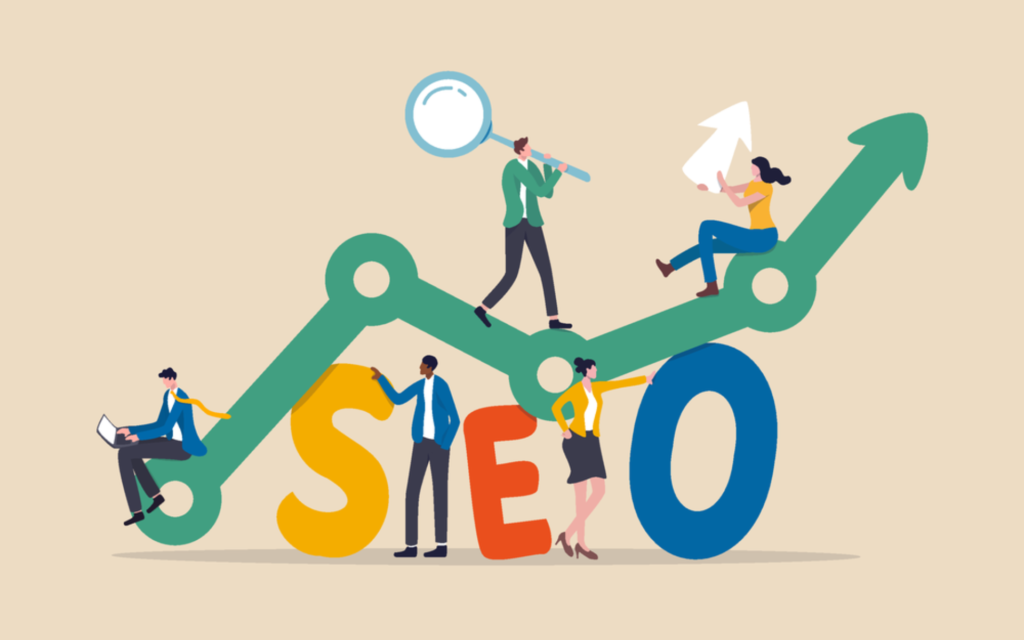5 Enterprise SEO Trends To Watch In 2023

SEO is becoming more and more important for business leaders who want to stay competitive as buying power continues to change and paid marketing costs continue to go down.
Decision-makers can remain adaptable in an ever-changing market landscape by utilising crucial insights into consumer trends gleaned from comprehensive SEO strategies.
This article identifies five critical opportunities and trends to monitor in 2023.
What Is Business SEO?
Enterprise SEO is the fundamental and strategic execution of organic programmes across organisations at the enterprise level.
This entails overseeing large-scale SEO initiatives for organisations with extensive websites and a broad variety of products.
Businesses that use enterprise SEO technology and core principles are usually big businesses with many departments and infrastructures.
The same holds true for businesses with thousands of webpages.
Enterprise SEO entails stakeholder management, planning and strategy, and alignment with corporate objectives, in addition to standard practises.

What Has Changed With Business SEO?
In 2022, this meant enhancing departmental and cross-channel collaboration as well as advancing workflow, reporting processes, and systems.
We also observed an increase in the number of SEO professionals utilising real-time data and insights and employing AI-based automation.
In 2023, SEO will be ingrained in organisations, and AI will be integrated into SEO as organisations seek cost-effective channels that can deliver return on investment (ROI) and incremental benefits in terms of compounding benefits.
With more than 90 percent of businesses intending to use SEO in 2023, it is here to stay.
It exists to evolve, adapt, and expand!
It is changing beyond its traditional boundaries, giving people who are quick, flexible, and adaptable new chances.
Five important enterprise SEO trends to monitor in 2023
1. Increasing SEO Value
As most marketers are being asked to do more, SEO-focused businesses see an annual return on investment that compounds.
My company, BrightEdge, does research on many different industries. Over the past year, we’ve noticed that executives are getting a better return on their SEO efforts.
During the past year, we monitored the performance of the top-ranking pages for the top 1,000 e-commerce terms.
According to click data, we discovered that this year, the same pages are driving 20% more keywords, culminating in a 1200% increase in traffic.
As users interact with your page, its authority grows.
And as more queries related to that page emerge, they are also displayed for those other keywords.
In addition, the traffic disappears if you cease investing in paid channels.
Consequently, it is notable that SEO has a compounding effect and that it drives significant value to e-commerce pages.
Long-term benefits come from the work that SEO experts do today.
Search Engine Algorithms, Best Practises, and Search Engine Updates
Even though we are only in the first quarter of 2023, the rate of change and innovation, particularly in AI, has been rapid.One of the hardest things for any kind of SEO marketer is to keep up with change.
The events of 2022 help marketers determine which areas to prioritise in 2023.
Listed below are a few examples:
Page Experience Updates such as Page Experience and Core Web Vitals were implemented to assist users in obtaining results and rendering pages rapidly.
In 2023, organisations must optimise their websites performance by combining data-driven insights with technical SEO.
This includes analysing page rendering speed, browser response times, and content integrity in order to provide the best user experience possible.
Google emphasises the importance of enhancing site functionality and producing engaging, pertinent content for success in this environment.
2. Product Algorithm Enhancement
This update was implemented to empower consumers by providing them with access to reliable information to assist them in making more informed purchasing decisions.
In 2023, marketers, particularly those in retail and ecommerce, should endeavour to revolutionise the purchasing experiences of consumers.
If you are selling products online, take pride in your professional abilities by providing trustworthy advice and content.
3. Google Advanced Search
In April of last year, Google Multisearch made it easier for consumers to find the precise information they need.
Google Lens enables users to conduct searches via images or text with speed and precision, delivering immediate results.
Additionally, it demonstrates how text and images are combined.
Expect Google’s AI to significantly improve how businesses provide accurate customer information in 2023.
Companies should optimise content for mobile image-to-text ratios in advance.
4. Beneficial Content Update
Google introduced the Beneficial Content Update to ensure that users have access to the most informative search results and to combat content that is not intended for the end user.
As technology advances with ChatGPT, so do standards for content creation.
In 2023, website proprietors and developers will be required to create content for human consumers, not robots or digital spiders.
Automated tools that generate duplicate content are now identifiable and ineffective.
If there is any hope for success with today’s sophisticated algorithms used by prominent search engines like Google, quality content must be carefully crafted.
With conversational AI and ChatGPT, AI has become mainstream.
AI has revolutionised the world of marketing for some time, ushering in a new era of innovation.
Pioneers such as IBM’s Watson and Google’s RankBrain have transformed how search engines function, while ChatGPT is pushing boundaries by introducing conversational features of AI directly to consumers.
The introduction of ChatGPT has accelerated the innovation and competition of search engines.
In addition, conversational AI applications such as Google Bard and Microsoft Bing Chatbot enable direct human-AI interaction.
It is essential to note, however, that: • Conversational AI applications are primarily standalone experiences; • interest will increase as more AI is incorporated into search engine algorithms.
ChatGPT has the potential to offer content marketers and SEO specialists unprecedented ease of use.
However, humans must monitor its use to ensure compliance with Google’s policies.
Detection systems will become more sophisticated as technology advances, but adherence to E-E-A-T (expertise, authority, and trustworthiness) standards and Beneficial Content Guidelines remains crucial.
In addition, it is essential to consider that the fundamentals of SEO have not changed.
SEO is still the foundation of web presence.
Best SEO practises entail producing content that is useful, discoverable by search engines, and engaging for human readers.
ChatGPT will be highly effective and scalable.
Smaller sites will benefit from faster creation times, while larger sites can utilise ChatGPT’s robust algorithms for more creative duties requiring individual attention.
ChatGPT, however, presents both opportunities and obstacles.
On the one hand, AI can assist us in automating certain repetitive SEO duties, such as keyword research and content optimisation.
This will allow us to devote more time to strategic and creative endeavours.
On the other hand, AI-powered voice assistants such as Siri and Alexa are gaining popularity, requiring us to optimise our content for voice search.
In order to scale enterprise SEO in 2023, automation will be required.
In addition to saving resources by handling mundane and repetitive tasks, automation frees up time to concentrate on creativity, strategy, and digital alignment—all of which are essential to the enterprise SEO mandate.
However, you should not devote your entire time to pursuing the algorithm.
Instead, let technology assist with detection, predetermination, and repair when and where necessary.
Humans cannot process all the available data.
The necessity of data lakes and business intelligence
According to Salesforce, nearly four out of five marketers believe that data integrity and intelligence are among the most influential factors fueling marketing performance—a crucial KPI for the enterprise search marketer.
Consumer preferences and behaviours are reflected in the manner in which inquiries are conducted.
Similarly, search reflects digital innovations and content creation trends.
As a consequence, the use and significance of search data as a source of vital business intelligence are increasing.
Search engine algorithms and ranking factors have become more sophisticated as the quantity of online information has increased.
Therefore, SEO practitioners must analyse more data to comprehend how search engines index and rank content.
In order to optimise their websites and enhance their search engine rankings, marketers must also monitor their websites traffic, monitor keyword performance, and analyse user behaviour.
Data lakes are large troves of unprocessed data that can be processed and analysed to extract valuable insights, and they are playing an increasingly vital role in search engine optimisation.
These also provide a centralised location for storing and managing immense quantities of data, enabling SEO professionals to access and analyse data from multiple sources in a single location.
By leveraging data lakes, SEO practitioners can obtain a deeper understanding of user behaviour and search engine rankings, enabling them to make more informed SEO strategy decisions.
In addition, they can identify patterns and trends in user behaviour, which can assist them in optimising their website and enhancing their search engine rankings.
Search business intelligence can assist organisations in accurately identifying what is most important to them and their industry.
It can also assist enterprise SEO professionals in viewing trends at both the macro-industry and granular-category levels.
In 2023, enterprise marketers must enhance their ability to demonstrate the value of business intelligence insights in order to drive enterprise-wide business benefits.
For example: • increasing brand recognition
• Offering product marketing feedback and insights for upcoming product introductions
• Constructing inbound and outbound campaigns for lead generation
• Communicating market trends to sales teams
• Providing information on intent and SERP/content types to content and digital teams.
5. SEO And The Delivery Of Comprehensive Experiences And Services
Enterprise SEO encompasses more than just optimisation.
It evolves cross-departmental management, business acumen, and the enterprise-wide administration of results.
Enterprise SEO involves the administration of experiences that may include: • Staff recruitment and retention.
• Management of personnel
• Utilisation and adoption of technology
• Professional consulting services
• Management of internal and external accounts
• optimisation of multiple digital assets and experiences
In 2023, enterprise SEO administration will place a greater emphasis on the following factors:
• organisation-wide SEO, content, and digital training and certification
• CEO, CMO, and SEO consensus on objectives and results
• Technology and platform management and training.
• internal and external evangelism of results; • enhanced collaboration with IT; and • a balance of AI and human capital.
By establishing an enterprise SEO centre of excellence, numerous organisations can achieve this goal.

